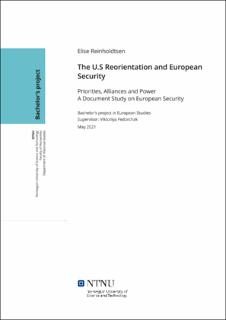| dc.contributor.advisor | Fedorchak, Viktoriya | |
| dc.contributor.author | Reinholdtsen, Elise | |
| dc.date.accessioned | 2021-10-08T17:21:31Z | |
| dc.date.available | 2021-10-08T17:21:31Z | |
| dc.date.issued | 2021 | |
| dc.identifier | no.ntnu:inspera:80491188:35448326 | |
| dc.identifier.uri | https://hdl.handle.net/11250/2788828 | |
| dc.description.abstract | I denne oppgaven tar jeg for meg USA pivot to Asia og hvordan deres nye strategi påvirker Europeisk forsvar og sikkerhetspolitikk. Det er flere faktorer som er med på å vise hvordan dette er et relativt komplekst spørsmål, med mange variabler. I denne oppgaven ser jeg på faktorer som maktbalanse, viktigheten og problematikken rundt europeisk autonomitet for Europa og USA. Europa har den siste tiden vist et ønske om å kunne være mer aktive innenfor forsvar og sikkerhetspolitikk. Dette er godt mottatt hos USA, men i hvor stor grad er de villige til å la Europa vokse til en potensiell internasjonal aktør, og ta sin plass ved siden av USA i den internasojnale ordenen? Verden er bygd opp av en anarkisk struktur, og alle ønsker å være på toppen av næringskjeden. I dag ser man at denne strukturen blir utfordret av både Russland og Kina. Denne oppgaven vil vise hvordan maktbalanse er en viktig del av opprettholdelsen av denne strukturen, samt hvordan den blir utfordret. USA må for eksempel gi opp noe av sin plass i denne strukturen for å slippe Europa til, for å kunne vise seg som en seriøs global aktør. Dette er likevel en utfordring for USA, vist gjennom sikkerhetsdilemmaet. Ved å gjøre dette vil de måtte gi opp noe av sin makt og innflytelse i Europa, og det er klart at dette vil endre samspillet mellom de to partene. USA`s pivot to Asia skaper også en mulighet for at den geopolitiske strukturen i Europa kan endre seg. Om dette skjer er muligheten for å se et sterkere Russland tilstede. Uansett, så er det en ting som er klart. Det er at USA og Europa som to mer likestilte aktører vil ha en mye sterkere posisjon i den internasjonale ordenen til å møte morgendagens utfordringer. | |
| dc.description.abstract | In this thesis, I consider the US pivot to Asia and how their new strategy affects European defense and security policy. There are several factors that help to show how this is a relatively complex issue, with many variables. In this thesis, I look at factors such as the balance of power, the importance, and the issue of European autonomy for Europe and the United States. Europe has recently shown a desire to be more active in defense and security policy. This is well received by the U.S, but to what extent are they willing to let Europe grow into a potential international actor and take its place next to the U.S in the international order? The world is made up of an anarchic structure, and everyone wants to be at the top of the food chain. Today this structure is being challenged by both Russia and China. This dissertation will show how balance of power is an important part of maintaining this structure, as well as how it is challenged. The U.S, for example, must give up some of its place in this structure in order to allow Europe to emerge as a serious global player. This is nevertheless a challenge for the U.S, shown through the security dilemma. By doing this, they will have to give up some of their power and influence in Europe, and it is clear that this will change the interaction between the two parties. The U.S pivot to Asia also creates a situation where the geopolitical structure in Europe potentially can change. If this happens, the prospect of seeing a stronger Russia is present. Either way, one thing is clear. The U.S and Europe, if they develop as two more equal actors, will have a much stronger position in the international order to meet tomorrow's challenges. | |
| dc.language | eng | |
| dc.publisher | NTNU | |
| dc.title | The U.S Reorientation and European Security | |
| dc.type | Bachelor thesis | |
